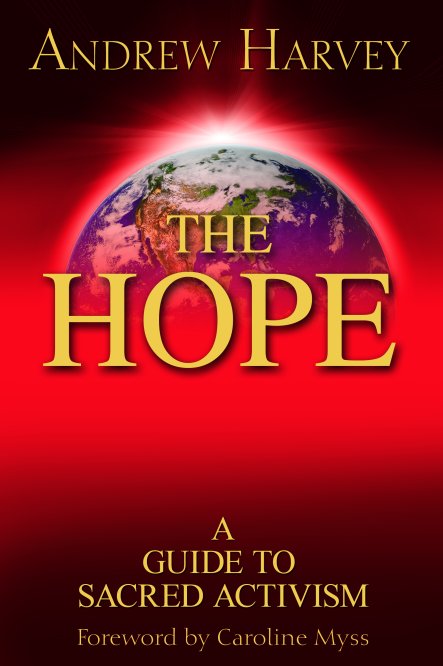This article is excerpted from the author's new book The Hope: A Guide To Sacred Activism, recently released by Hay House and used by permission. Read our second excerpt from this book here.
An elderly black woman was brought by the Truth and Reconciliation Commission face to face with the man, Mr. Van de Broek, who had confessed to the savage torture and murder of both the woman's son and her husband a few years earlier. The old woman had been made to witness her husband's death. The last words of her husband had been "Father forgive them."
One of the members of the Commission turned to her and asked "How do you believe justice should be done to this man who has inflicted such suffering on you and so brutally destroyed your family?"
The old woman replied "I want three things. I want first to be taken to the place where my husband's body was burned so that I can gather up the dust and give his remains a decent burial." She stopped, collected herself, and then went on. "My husband and son were my only family. I want, secondly, therefore, for Mr. Van de Broek to become my son. I would like for him to come twice a month to the ghetto and spend a day with me so that I can pour out to him whatever love I have still remaining with me. And finally, I want a third thing. I would like Mr. Van de Broek to know that I offer him my forgiveness because Jesus Christ died to forgive. This was also the wish of my husband. And so, I would kindly ask someone to come to my side and lead me across the courtroom so that I can take Mr. Van de Broek in my arms, embrace him, and let him know that he is truly forgiven."
The assistants came to help the old black woman across the room. Mr. Van de Broek, overwhelmed by what he had just heard, fainted. And as he did, those in the courtroom — friends, family, neighbors — all victims of decades of oppression and injustice — began to sing "Amazing Grace, how sweet the sound that saved a wretch like me."
The first time I read this sacred story, one detail leapt out and felled me with its truth: "Mr. Van de Broek, overwhelmed by what he had just heard, fainted." Nothing in his brutal and degraded past could have prepared Mr. Van de Broek for what the black woman to whom he had given such pain gave him in return, not fury, nor a call for his execution, but unconditional forgiveness and a reclaiming of him into the human family as a whole and into her own immediate family. And the sacred power, flowing through her because of her humility and faith, did not merely "move" Mr. Van de Broek; it fell on him like invisible lightning from a dimension of pure love he may never have begun to suspect existed. In that moment, two extraordinary journeys, both terrible in different ways, intersected in an explosion of grace.
You can read this story and be deeply moved by it but think that its relevance to the gritty problems of world affairs is marginal. This is a mistake. Anyone who has been involved with the Palestinian/Israeli and the India/Pakistan conflicts — the two most dangerous conflicts in our world — must know by now that any purely political solution, a changing of boundaries, exchange of money or power, has only a very small chance of working. In such extreme situations — and extreme situations characterize increasingly all realms of our world — only extreme solutions born from another dimension of truth and compassion have any real chance of being effective. There will be no end to the potential horror in the Middle East and in the India/Pakistan conflict in Kashmir until a great many people on both sides have made the amazing and humbling journey of the elderly black woman to unconditional forgiveness, not from a position of weakness or defeat, but from a mysterious inner experience of the nature of God as being one of all-embracing Mercy. While dauntingly difficult, such a journey is by no means impossible; countless numbers of anonymous and so-called ordinary beings have made it throughout history and are making it now in Serbia, Rwanda, Darfur, Cambodia, the Congo, and Zimbabwe even in the middle of storms of terror.
Such a height of unconditional forgiveness and embrace is also essential to the success of all the major activist adventures in our world. Savage denunciation — of corrupt corporations and lazy politicians, and of a media in bed with "systems of cold evil" that want to keep exploiting the earth – – may have truth in its fury. But it has two main disadvantages in practical affairs; the excitement of projecting onto others your own unacknowledged darkness blinds you from seeing just how implicated you are and ensures that your advocacy of your case increases rather than heals resistance. Human beings are never going to be convinced to change their ways by other human beings who try to humiliate them through self-righteous contempt. In almost every case, such condemnation only reinforces the behavior it is trying to end: when someone is accused of something they know they are guilty of by someone whom they can see has contempt for them, they nearly always retreat even further into their self-destructive behavior, or if they do change, it is from fear, or even hypocrisy, and not from their own truth.
One of the main reasons that the environmental movement has been so disappointing in its overall public effect is because of the fierce moralism of many of its pronouncements, and the implication of many environmental activists that they and they alone are "right" and that the rest of humanity is almost worthy of the extinction they are creating for themselves. It is hard to avoid such self-righteousness and disdain when speaking to people you feel are continuing outrageous abuses. Only radical shadow-work and incessant prayer open the doors to the kind of humility in which those opposed to what you believe cease to be "other" and call out from you respect and compassion. The most effective negotiators in situations of extreme danger or conflict are always those whose experience of their own continuing inner conflicts make them human and humble and who work not to exclude anyone — even those who have continually indulged in acts of brutality and destruction — from the circle of humanity and forgiveness.
It would be sentimental to imagine that negotiators who work in this spirit always succeed. What you can say, however, is that their path shows us the way to the only solutions that could be permanently effective because they are rooted not only in a rearrangement of rational demands, but in a fundamental change of heart that can, when the circumstances are right, effect a shift as profound as that which felled Mr. Van de Broek to the ground.
Let me give you an example from my own experience in which I was myself inspired and changed by the story of the elderly black woman. Last year, a man who had read my book on Rumi, The Way of Passion, wrote to me and told me about his life and about how he had ended up getting a twenty-year jail sentence for torturing animals. He said that he knew that the same horrifying impulses that had led him to such brutality still lived in him and he wrote to ask me for my help.
I can still remember my sorrow and horror at reading his letter. The torture of children and animals torments me so much that I know I have difficulty keeping any kind of balance on either subject. But I know, too, that any kind of disgust I allowed to linger in my heart toward this man would pervert any words of comfort or encouragement I could offer him. I would have no hope of helping him if I did not aim for the height of unconditional love that the black woman in the story spoke from. If she could forgive the man who had murdered her own husband and son, who was I not to try and forgive him?
I prayed for days to be given the strength to approach the man who had written to me in a way untainted by self-righteousness or disgust. I had to come to face three things: that an animal torturer existed also in me as it does in anyone who, however momentarily, enjoys power over the weak or helpless; that the man who had done these terrible things had, from his own account of his life, had terrible things done to him; that while the animals he had tortured and killed were dead, he was still alive and in need of understanding and compassion and needed them even more now that he was beginning to see and feel just how horrific his actions were.
The combination of these three perspectives, meditated on for days, finally gave me the strength and peace and inner balance to write to him sincerely and without, I hope, any trace of condemnation. I told him frankly about how I had felt when I read his letter and also of the journey his honesty had compelled me on. I thanked him for it because without being forced to take it, I would still have been unconsciously separating myself from people who had done the things he had, imagining myself to be superior and incapable of such brutality. We wrote to each other several times and with each growing account of what he had undergone as a child and in the various criminal institutions he had lived in most of his life, my compassion for him and admiration at his passion for transformation grew. Would I have had the courage to believe I COULD change after doing what he had done? Would I have had the stamina to undo the kind of lacerating self-hatred he had had to endure? I am not sure. The compliment that he paid me in the last letter he wrote me I will cherish and try to live up to: "thank you above all for making me feel that I have given YOU something. You will never know what that has meant to me. It has meant everything. It has given me a hope that saves me again and again from drowning in despair."
Two weeks after receiving this last letter I had the occasion to sit down with the head of one of the most environmentally destructive corporations in the world. Because I had studied the record of this corporation in certain South American countries, I knew much more than I wanted to both about the CEO and the snaky dealings of the corporation. I had no illusions, of course, that an hour spent with Andrew Harvey would affect a change of heart and result in an immediate world-wide change in corporate energy policy. I did know, however, that this was a cynical man who had the lowest opinion of "whiny self-righteous environmentalists" and an even lower one, if possible, of religious leaders whom he referred to contemptuously (he was British) "as a bunch of hypocritical and bone-headed wankers." He had consented to see me because he was intrigued by my Oxford professorial background and had heard one of my tapes and thought it "almost interesting" which for him I gathered was high praise.
In the days before we met I found myself asking the question, what would the elderly black woman do faced with such a man, who in his own way had committed or abetted crimes perhaps even greater than those of the Boer torturer? The more I asked the question, the more its answer became clear to me. She would go in and sit opposite him and see him as he really was — not as a criminal, but as the lost and bewildered human being he must also be to go on choosing to be enslaved to the religion of power. She would sit before him knowing that he was an aspect of herself. She would sit before him and pray to be the empty channel of a love and mercy and intelligence she knew was far greater and wiser than her own in the hope that they would know what to say and how to say it.
I prayed for days before the meeting to be worthy of the elderly black woman's example. In the event the heavens did not open, this man certainly did not faint and there was not even an inaudible and invisible chanting of Amazing Grace. But because of the attitude I walked in with (and no doubt also because of his own genuine goodwill) two small subtle miracles did take place, which neither of us could have imagined. We genuinely liked each other; freed of the need to condemn him I could appreciate his brilliance, his wit, his love of cricket and classical music, the genuine if sporadic charm that flashed out from his incessant need to dominate and manipulate. Because I did not attack or humiliate him, he was able to admit at the end of our conversation that it "was essential to start up a conversation about ethics in corporate activity." I have no idea if he will make good on his promise or even whether what he said was another way of winning the day ("these religious wankers are so vain and stupid they'll believe anything"). What I do know is that for moments we were able to be free of our mutual prejudices. In those moments, the beginnings of a spontaneous dialogue beyond both of our roles — his as a Capitalist conquistador and mine as Sacred Activist Scourge — flowered. What I also know is that it is from moments such as these that new kinds of conversations between people who have been "opposed" to each other can begin with potentially transformative consequences.
Unconditional love and forgiveness of others is not only for saints and Buddhas. If you think like that you will never explore your own capacity to love and forgive in far wider ways than you have ever imagined. The sublime courage of the African woman is more accessible to us than we think, once we have the heart-intelligence to realize its necessity, and the humility to ask the Divine to help us realize it. One of the things my life has persuaded me of is that we are all capable of both greater acts of destructiveness and of heroism than we want or dare to imagine.
Andrew Harvey is an internationally acclaimed poet, novelist, translator, mystical scholar, and spiritual teacher. He is the architect of a modern day spiritual movement known as Sacred Activism. He has published over 20 books including Son of Man (Tarcher/Putnam) and The Return of the Mother (North Atlantic Books) . Harvey is the Founder/Director of the Institute of Sacred Activism in Oak Park, Illinois, where he lives. His website is www.andrewharvey.net.
©Copyright 2009 Andrew Harvey
Andrew will give a lecture on Sacred Activism and the World
Crisis, and sign copies of his new book, The Hope: A Guide to Sacred Activism, at One Spirit Learning Alliance in New York City on September 24, 2009 from 7 – 9:30PM. One Spirit Learning Alliance is at 330 West 38th Street (between 38th and 39th), Suite 1500.
Teaser photo by Tapperboy, courtesy of Creative Commons license.














